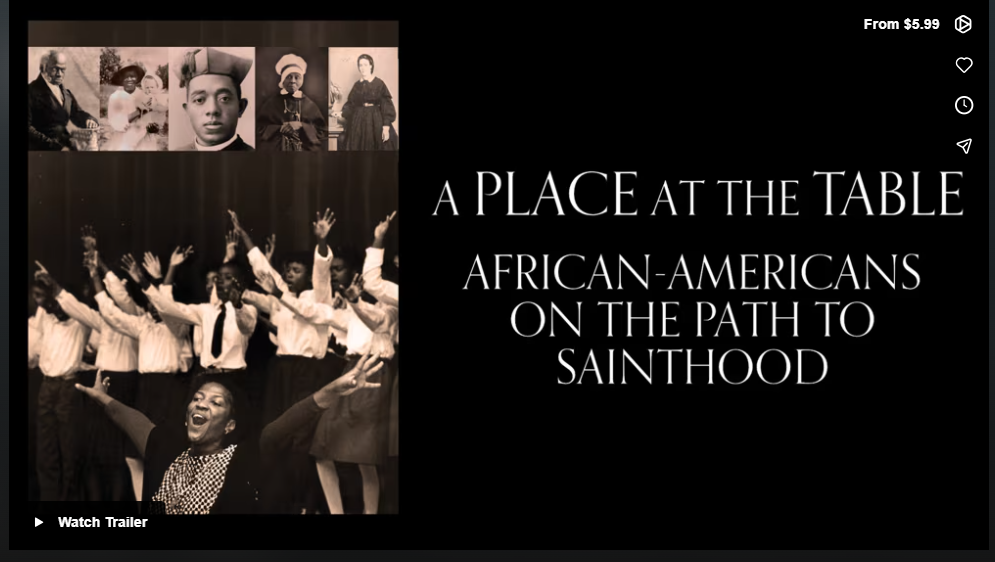The archdiocesan Office for Black Catholics aims to use a recently-released movie about Black American candidates for sainthood to help youth and young adult Philadelphians find their own place within the Church.
The office is hosting an online movie night, showing “A Place at the Table: African Americans on the Path to Sainthood.” It will be available through a link on the Office for Black Catholics page on Thursday, Nov. 20 at 6 p.m. People can watch the trailer here, but the movie-watching experience through the Office for Black Catholics is free.
Stacy Williams, the office’s director, says that the movie helps tackle the questions many younger Black Catholics ask about where they stand in the modern Church — questions she often receives from the young people in the pews.
“It is talking about young African Americans and their places in the Church, how some of them have embraced that place, and how some of them feel about whether or not they’re welcome in the Church,” she says.
“I made a point of looking for young adults to bring on my leadership team so that we can have this conversation about where they think their Church is now, how they see themselves within the Church, what it’s like for them as young Black Catholics within their Church. How do they see the diocese? What do they think about it? What would they do differently? What are their suggestions?”
Those questions will come in the discussion that will be intertwined with the move, one in which five Black Catholic clergy members share their own perspectives about belonging.
Those clergy members’ stories are fused with those of six Black Catholics who are potentially on the path to sainthood:
– Servant of God Sister Thea Bowman, FSPA, the only African American member of the Franciscan Sisters of Perpetual Adoration.
– Venerable Sister Henriette Delille, SSF, who founded the Sisters of the Holy Family.
– Servant of God Sister Julia Greeley, OFS, known as the “Angel of Denver” for her work with under-resourced people.
– Servant of God Mother Mary Elizabeth Lange, OSP, founder of the Oblate Sisters of Providence.
– Venerable Father Augustus Tolton, who became a missionary in his home state of Illinois.
– Venerable Pierre Toussaint, who opened his New York home to orphans and educated them after gaining freedom from slavery.
“It is about those who are up for sainthood, and how they pushed forward against all the kinds of things that they were dealing with, mainly racism to the ‘nth degree.’ They pushed forward anyway, and did what they could do. They made an impact,” said Williams.
“Our ancestors who are now up for sainthood went around, under and sideways, sidestepping those things that they experienced to still step up into leadership positions.”
Williams sees the six saint candidates’ lives as examples for what young Black Catholics have the ability to do. She cites Venerable Tolton’s experience as a powerful example.
“Tolton escaped slavery with his mother. He was brought into Ohio and was not afforded opportunities to be educated. Parents of those children refused to send their kids to school with this child because he was Black. He also felt called to the priesthood, and his pastor couldn’t find one seminary in the country that would allow him study to be a priest. Yet he was not afraid to leave this country and to go to Rome so that he could study and achieve what he wanted to be,” said Williams.
“Sometimes there’s a way around the mountain that’s in your way. You can’t be afraid to take that opportunity when it’s presented to you.”
Williams hopes examples like Venerable Tolton dispels similar perceptions young people may feel about their own ability to impact through and within the Church, and shows them the ability to find alternate pathways to answering God’s call in the Catholic faith.
“How do we take what we learned from them and apply it to our own lives so that we can push forward, become that leadership, and make a difference and expand Black Catholic participation within this Archdiocese? That’s what we’re going to talk about as young Black Catholics,” Williams said.
“How do you see yourself? What do you see yourself as doing? Where do you see yourself in ten years? What do you want to do as a Black Catholic? What are the things in your way and how can we circumvent those things?”
She aims for this movie night to not only inspire young Black Catholics to find their own paths within the faith. She wants the feedback they receive to help inform the office’s work to more effectively minister to young people and help accompany these young people’s journeys.
“We want to be able to take this conversation into the next conversation, and really come up with a plan about how we can make this impact on the Black Catholic community that will then make a larger impact on the larger community,” she says.
“We really need for it to happen if we’re serious about moving the Black Catholic community forward.”
PREVIOUS: Young Women of Blaze Club Offer Faithful Works of Mercy
NEXT: Philadelphia Pilgrims Share Their NCYC 2025 Experience



Share this story